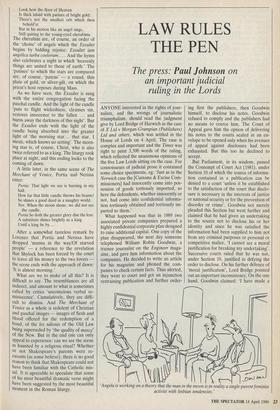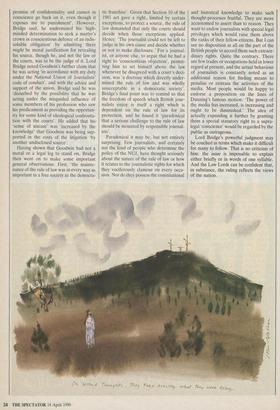LAW RULES THE PEN
The press: Paul Johnson on
an important judicial ruling in the Lords
ANYONE interested in the rights of jour- nalists, and the wrongs of journalistic triumphalism, should read the judgment give by Lord Bridge of Harwich in the case of X Ltd v Morgan-Grampian (Publishers) Ltd and others, which was settled in the House of Lords on 4 April. The case is complex and important and the Times was right to print 3,500 words of the ruling, which reflected the unanimous opinions of the five Law Lords sitting on the case. For connoisseurs of judicial prose it contained some choice speciments, eg: 'Just as in the Norwich case the [Customs & Excise Com- missioners] had innocently come into pos- session of goods tortiously imported, so here the defendents, whether innocently or not, had come into confidential informa- tion tortiously obtained and tortiously im- parted to them.' What happened was that in 1989 two associated private companies prepared a highly confidential corporate plan designed to raise additional capital. One copy of the plan disappeared, the next day someone telephoned William Robin Goodwin, a trainee journalist on the Engineer maga- zine, and gave him information about the companies. He decided to write an article for his magazine and phoned the com- panies to check certain facts. Thus alerted, they went to court and got an injunction restraining publication and further order- ing first the publishers, then Goodwin himself, to disclose his notes. Goodwin refused to comply and the publishers had no means to coerce him. The Court of Appeal gave him the option of delivering his notes to the courts sealed in an en- velope to be opened only when his avenues of appeal against disclosure had been exhausted. But this too he declined to accept.
But Parliament, in its wisdom, passed the Contempt of Court Act (1981), under Section 10 of which the source of informa- tion contained in a publication can be denied to a court 'unless it be established to the satisfaction of the court that disclo- sure is necessary in the interests of justice or national security or for the prevention of disorder or crime'. Goodwin not merely pleaded this Section but went further and claimed that he had given an undertaking to the source not to disclose his or her identity and since he was satisfied the information had been supplied to him not from any criminal purposes or personal or competitive malice, 'I cannot see a moral justification for breaking my undertaking'. Successive courts ruled that he was not, under Section 10, justified in defying the order to disclose. On his further defence of 'moral justification', Lord Bridge pointed out an important inconsistency. On the one hand, Goodwin claimed: 'I have made a 'Angela is working on a theory that the man in the moon is in reality a single parent feminist activist with lesbian tendencies.' promise of confidentiality and cannot in conscience go back on it, even though it exposes me to punishment'. However, Bridge said, he undermined his 'high- minded determination to seek a martyr's crown in conscientious defence of an indis- soluble obligation' by admitting there might be moral justification for revealing his source, though he, and not the law or the courts, was to be the judge of it. Lord Bridge noted Goodwin's further claim that he was acting 'in accordance with my duty under the National Union of Journalists' code of conduct', and with the advice and support of the union. Bridge said he was 'disturbed by the possibility that he was acting under the misguided influence of some members of his profession who saw his predicament as providing the opportun- ity for some kind of ideological confronta- tion with the courts'. He added that his 'sense of unease' was 'increased by the knowledge' that Goodwin was being sup- ported in the costs of the litigation 'by another undisclosed source'.
Having shown that Goodwin had not a moral or a legal leg to stand on, Bridge then went on to make some important general observations. First, 'the mainte- nance of the rule of law was in every way as important in a free society as the democra- tic franchise'. Given that Section 10 of the 1981 act gave a right, limited by certain exceptions, to protect a source, the rule of law demanded that only the courts should decide when those exceptions applied. Hence: 'The journalist could not be left to judge in his own cause and decide whether or not to make disclosure.' For a journal- ist, or anyone else, to argue that he had a right to 'conscientious objection', permit- ting him to set himself above the law whenever he disagreed with a court's deci- sion, was 'a doctrine which directly under- mined the rule of law and was wholly unacceptable in a democratic society'. Bridge's final point was to remind us that the freedom of speech which British jour- nalists enjoy is itself a right which is dependent on the rule of law for its protection, and he found it 'paradoxical that a serious challenge to the rule of law should be mounted by responsible journal- ists'.
Paradoxical it may be, but not entirely surprising. Few journalists, and certainly not the kind of people who determine the policy of the NUJ, have thought seriously about the nature of the rule of law or how it relates to the journalistic rights for which they vociferously clamour on every occa- sion. Nor do they possess the constitutional and historical knowledge to make such thought-processes fruitful. They are more accustomed to assert than to reason. They want to endow journalists with special legal privileges which would raise them above the ranks of their fellow-citizens. But I can see no disposition at all on the part of the British people to accord them such extraor- dinary rights. Quite the contrary. There are few trades or occupations held in lower regard at present, and the actual behaviour of journalists is constantly noted as an additional reason for finding means to penalise or restrain the activities of the media. Most people would be happy to endorse a proposition on the lines of Dunning's famous motion: 'The power of the media has increased, is increasing and ought to be diminished.' The idea of actually expanding it further by granting them a special statutory right to a supra- legal 'conscience' would be regarded by the public as outrageous.
Lord Bridge's powerful judgment may be couched in terms which make it difficult for many to follow. That is no criticism of him: the issue is impossible to explain either briefly or in words of one syllable. And the Law Lords can be confident that, in substance, the ruling reflects the views of the nation.



















































 Previous page
Previous page